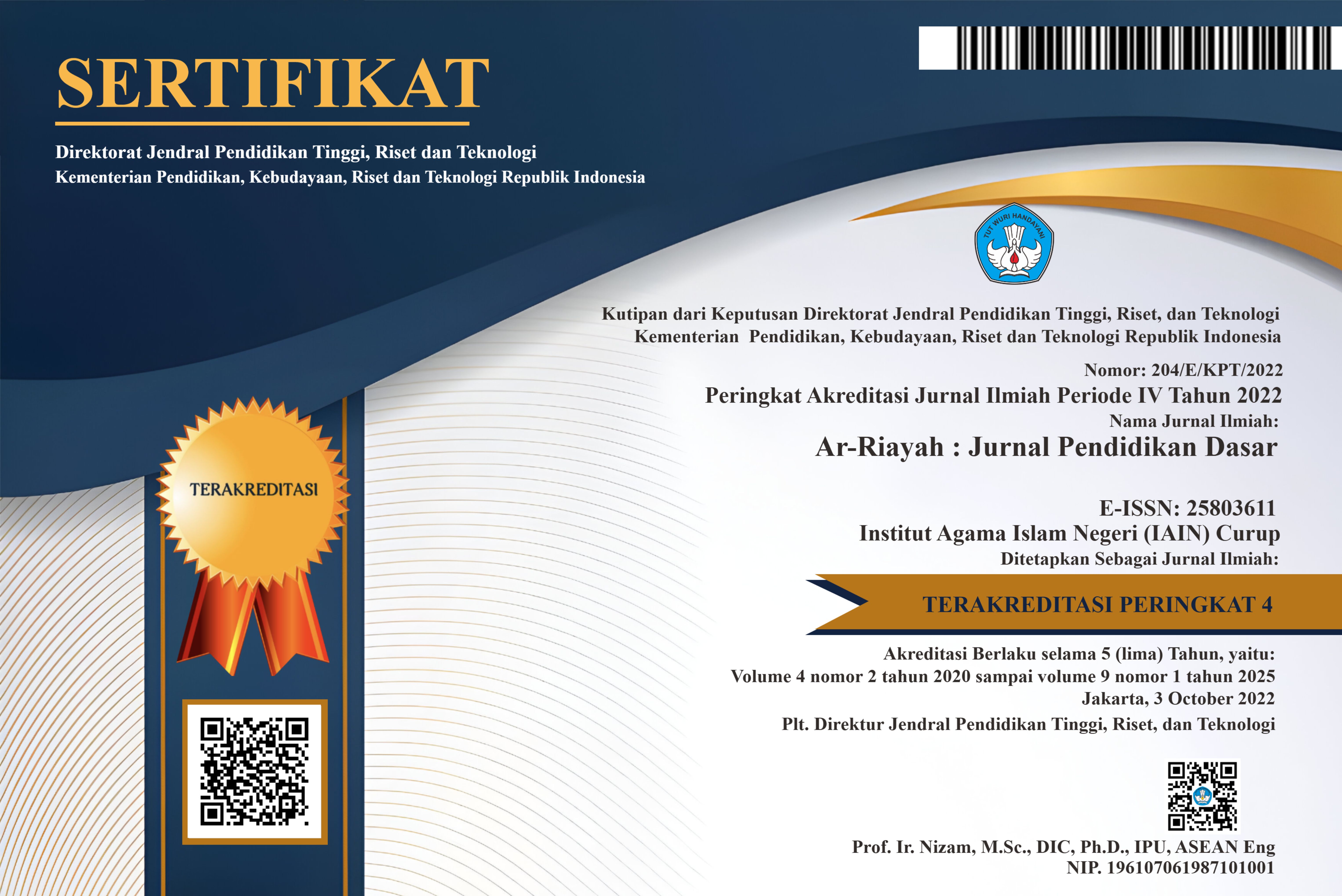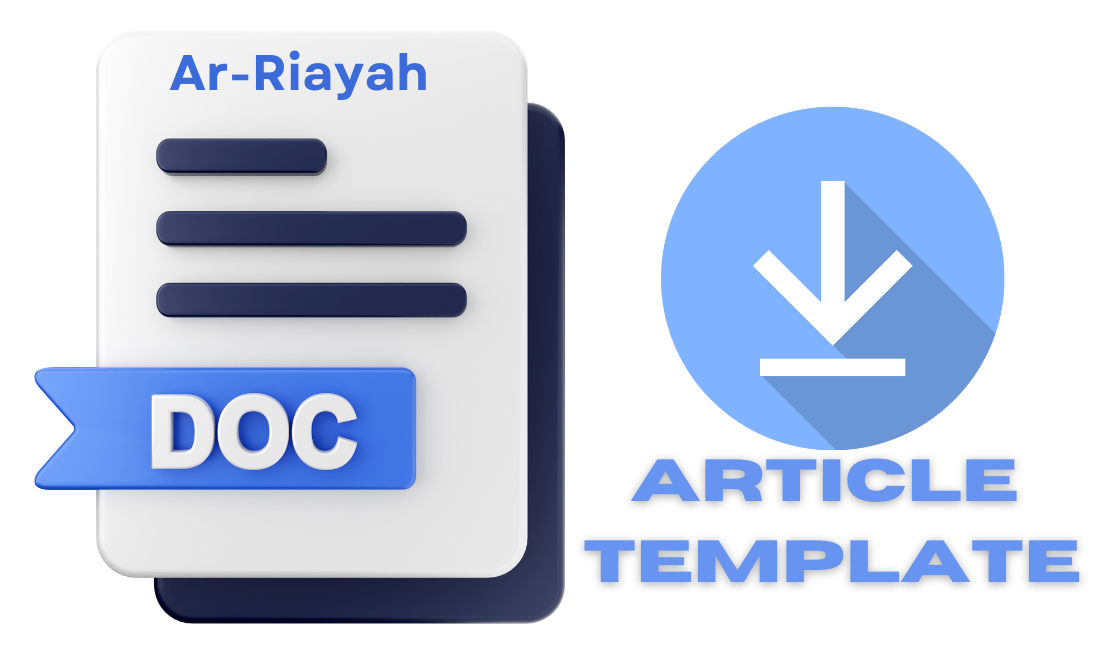Analisis Kemampuan Literasi Sains Siswa dalam Upaya Mewujudkan Karakter Peduli Lingkungan di Sekolah Adiwiyata SDN Karang Mulya
DOI:
https://doi.org/10.29240/jpd.v8i1.9930Keywords:
Scientific Literacy Ability, Environmental Care CharacterAbstract
This research is motivated by a phenomenon that occurs, namely the environmentally conscious character of students who are already good because they attend Adiwiyata schools. Teachers at SDN Karang Mulya implement various efforts to realize and develop the environmentally caring character of their students, one of which is through learning based on scientific literacy. Seeing the phenomenon that occurred at the school in question, the researchers were interested in taking a more in-depth picture of the students' already good environmentally caring character by looking at the students' scientific literacy abilities. This research aims to (1) determine the scientific literacy abilities of class V students at SDN Karang Mulya. (2) know the ways or efforts to realize the character of caring for the environment. (3) find out the implications regarding scientific literacy skills in realizing environmentally caring character. This research uses a qualitative approach with descriptive methods. The data collection techniques used were interviews, observation and documentation. The subjects of this research were teachers and students of class V at SDN Karang Mulya. This research data was analyzed by data reduction, data presentation, and drawing conclusions or verification. The results of this research are that the average scientific literacy ability of students at SDN Karang Mulya is 80%. Meanwhile, the average environmentally conscious character of class V students at SDN Karang Mulya is 76.25%. The implications for teachers are, if students have good scientific literacy skills, it will be easier for teachers to carry out the learning process in class and teachers will also find it easier to realize and develop students' environmentally caring character. Meanwhile, the implication for schools is that if students have a good environmentally caring character, such as throwing rubbish in the right place according to its type, always carrying out daily pickets, carrying out reforestation, utilizing used plastic goods, and doing community service, the school environment will always be clean, comfortable and beautiful.
Downloads
References
Abidin, Y. dkk. (2017). Pembelajaran Literasi. Jakarta: Bumi Aksara.Adiwiyata, S. (2021). Pembentukan Karakter Peduli Lingkungan Siswa Pada Sekolah Adiwiyata.
Al-Anwari, A. M. (n.d.). Strategi pembentukan karakter peduli lingkungan di sekolah adiwiyata mandiri. XIX(02), 227–252.
Al-Anwari, Amirul Mukminin. 2014. “Strategi Pembentukan Karakter Peduli Lingkungan Di Sekolah Adiwiyata Mandiriâ€. Ta’dib: Journal of Islamic Education (Jurnal Pendidikan Islam) 19(02).
Anjarsari, P. (2014). Literasi Sains Dalam Kurikulum Dan Pembelajaran Ipa Smp. Prosiding Semnas Pensa VI â€Peran Literasi Sainsâ€.
Choerunnisa, R., Wardani, S.,& Sumarti, S. S. (2017).Keefektifan pendekatan contextual teaching learning dengan model pembelajaran inkuiri terhadap literasi sains. Jurnal Inovasi Pendidikan Kimia, 11(2)1945–1956.
Daryanto dan Suryatri Darmiatun. 2013. Implementasi Pendidikan Karakter di Sekolah. Yogyakarta: Gava Media.
Emzir. (2012). Metodologi Penelitian Kualitatif Analisis Data. Jakarta: Rajawali Pers
Fachrudin M. Mangunwijaya, Husain Heriyanto, Reza Gholami (2007). Menanam sebelum Kiama: Islam, Ekologi, dan Gerakan Lingkungan Hidup. (Jakarta: Yayasan Obor Indonesia)
Hendrikus Literasi Lingkungan Sebagai Upaya Menumbuhkan Karakter Peduli Lingkungan Di Sd Negeri, P., Kecamatan Kelam Permai Kabupaten Sintang, K., Kurniati, A., Parida, L., & STKIP Persada Khatulistiwa Sintang, H. (2022). Literasi Lingkungan Sebagai Upaya Menumbuhkan Karakter Peduli Lingkungan Di Sd Negeri 01 Kenukut Kecamatan Kelam Permai Kabupaten Sintang. JPPM: Jurnal Pelayanan Dan Pemberdayaan Masyarakat, 1(1), 21–26. https://jurnal.stkippersada.ac.id/jurnal/index.php/absa/article/view/1859
Jurnal Pendidikan Karakter, 1, 90–101. Https://Doi.Org/10.21831/Jpk.V0i1.8615
Kurnia, F., Zulherman, Z., & Fathurohman, A. (2014). Analysis of Physics Teaching Material for Grade XI in the district of north Indralaya based on scientific literacy themes. Faculty of Teacher Training and Education,Sriwijaya University.
Lexy, J.Moleong.(2006). Metodologi Penelitian Kualitatif. Bandung : PT.Remaja Rosdakarya.
Pratiwi, S. N., Cari, C., & Aminah, N. S. (2019). Pembelajaran IPA Abad 21 dengan Literasi Sains Siswa. Jurnal Materi Dan Pembelajaran Fisika, 9, 34–42. Peraturan Menteri Lingkungan Hidup Republik Indonesia, Pasal 1 tentang Pedoman Pelaksanaan Program Adiwiyata Nomor 05 Tahun 2013, 14 Mei 2013.
Purwanti, D. (2017). Pendidikan Karakter Peduli Lingkungan Dan Implementasinya. DWIJA CENDEKIA: Jurnal Riset Pedagogik, 1(2), 14–20. https://doi.org/10.20961/jdc.v1i2.17622
Rizal, S., & Meidawaty, S. (2020). Membangun Kepedulian Lingkungan Peserta Didik Mi Melalui Literasi Sains. 380 Pandawa : Jurnal Pendidikan Dan Dakwah, 2(2), 378–387.
Siskayanti, J., & Chastanti, I. (2022). Analisis Karakter Peduli Lingkungan pada Siswa Sekolah Dasar. Jurnal Basicedu, 6(2), 1508–1516. https://doi.org/10.31004/basicedu.v6i2.2151
Sugiyono.2006.Metode Penelitian Kuantitatif, Kualitatif dan R & D. Bandung:Alfabeta.
Suharsimi, Arikunto. (2002). Prosedur Penelitian Suatu Tindakan Praktek. Jakarta : Rineka Cipta
Syamsi, A. (2022). Analisis Respon Siswa MI Terhadap Model Siklus Belajar Berbasis Positive Learning Environment (Sibelpolen) Sebagai Upaya Optimalisasi Literasi Sains. AR-RIAYAH: Jurnal .
Syamsi, A., M.S., Z., & Yufiarti, Y. (2020). Improving Students’ Scientific Literacy through the Cycle-based Learning Model. TARBIYA: Journal of Education in Muslim Society, 7(1), 133–141. https://doi.org/10.15408/tjems.v7i1.16941
Wiratna Sujarweni. 2018. Metodologi Penelitian Bisnis dan Ekonomi Pendekatan Kuantitatif. Yogyakarta: Pustaka Baru Press.
Downloads
Published
How to Cite
Issue
Section
Citation Check
License
Copyright (c) 2024 Devina Lustianti, Atikah Syamsi, Nur Atikoh

This work is licensed under a Creative Commons Attribution-NonCommercial-ShareAlike 4.0 International License.
Authors who publish with Ar-Riayah: Jurnal Pendidikan Dasar agree to the following terms:
Authors retain copyright and grant the journal right of first publication with the work simultaneously licensed under a Creative Commons Attribution-NonCommercial-ShareAlike 4.0 International License (CC BY-NC-SA 4.0) that allows others to share the work with an acknowledgment of the work's authorship and initial publication in this journal.
Authors are able to enter into separate, additional contractual arrangements for the non-exclusive distribution of the journal's published version of the work (e.g., post it to an institutional repository or publish it in a book), with an acknowledgment of its initial publication in this journal.
- Authors are permitted and encouraged to post their work online (e.g., in institutional repositories or on their website) prior to and during the submission process, as it can lead to productive exchanges, as well as earlier and greater citation of published work (See The Effect of Open Access).










